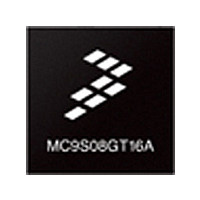MC9S08GT16CFB Freescale Semiconductor, MC9S08GT16CFB Datasheet - Page 129

MC9S08GT16CFB
Manufacturer Part Number
MC9S08GT16CFB
Description
Manufacturer
Freescale Semiconductor
Datasheet
1.MC9S08GT16CFB.pdf
(290 pages)
Specifications of MC9S08GT16CFB
Cpu Family
HCS08
Device Core Size
8b
Frequency (max)
20MHz
Interface Type
SCI/SPI
Program Memory Type
Flash
Program Memory Size
16KB
Total Internal Ram Size
1KB
# I/os (max)
36
Number Of Timers - General Purpose
4
Operating Supply Voltage (typ)
2.5/3.3V
Operating Supply Voltage (max)
3.6V
Operating Supply Voltage (min)
2.08V
On-chip Adc
8-chx10-bit
Instruction Set Architecture
CISC
Operating Temp Range
-40C to 85C
Operating Temperature Classification
Industrial
Mounting
Surface Mount
Pin Count
44
Package Type
PQFP
Lead Free Status / Rohs Status
Not Compliant
Available stocks
Company
Part Number
Manufacturer
Quantity
Price
Company:
Part Number:
MC9S08GT16CFBE
Manufacturer:
FREESCALE
Quantity:
1 831
Company:
Part Number:
MC9S08GT16CFBE
Manufacturer:
Freescale Semiconductor
Quantity:
10 000
Part Number:
MC9S08GT16CFBE
Manufacturer:
FREESCALE
Quantity:
20 000
Company:
Part Number:
MC9S08GT16CFBER
Manufacturer:
Freescale Semiconductor
Quantity:
10 000
- Current page: 129 of 290
- Download datasheet (2Mb)
V — Two’s Complement Overflow Flag
H — Half-Carry Flag
I — Interrupt Mask Bit
N — Negative Flag
Z — Zero Flag
C — Carry/Borrow Flag
Freescale Semiconductor
The CPU sets the overflow flag when a two’s complement overflow occurs. The signed branch
instructions BGT, BGE, BLE, and BLT use the overflow flag.
The CPU sets the half-carry flag when a carry occurs between accumulator bits 3 and 4 during an
add-without-carry (ADD) or add-with-carry (ADC) operation. The half-carry flag is required for
binary-coded decimal (BCD) arithmetic operations. The DAA instruction uses the states of the H and
C condition code bits to automatically add a correction value to the result from a previous ADD or
ADC on BCD operands to correct the result to a valid BCD value.
When the interrupt mask is set, all maskable CPU interrupts are disabled. CPU interrupts are enabled
when the interrupt mask is cleared. When a CPU interrupt occurs, the interrupt mask is set
automatically after the CPU registers are saved on the stack, but before the first instruction of the
interrupt service routine is executed.
Interrupts are not recognized at the instruction boundary after any instruction that clears I (CLI or
TAP). This ensures that the next instruction after a CLI or TAP will always be executed without the
possibility of an intervening interrupt, provided I was set.
The CPU sets the negative flag when an arithmetic operation, logic operation, or data manipulation
produces a negative result, setting bit 7 of the result. Simply loading or storing an 8-bit or 16-bit value
causes N to be set if the most significant bit of the loaded or stored value was 1.
The CPU sets the zero flag when an arithmetic operation, logic operation, or data manipulation
produces a result of $00 or $0000. Simply loading or storing an 8-bit or 16-bit value causes Z to be set
if the loaded or stored value was all 0s.
The CPU sets the carry/borrow flag when an addition operation produces a carry out of bit 7 of the
accumulator or when a subtraction operation requires a borrow. Some instructions — such as bit test
and branch, shift, and rotate — also clear or set the carry/borrow flag.
1 = Overflow
0 = No overflow
1 = Carry between bits 3 and 4
0 = No carry between bits 3 and 4
1 = Interrupts disabled
0 = Interrupts enabled
1 = Negative result
0 = Non-negative result
1 = Zero result
0 = Non-zero result
1 = Carry out of bit 7
0 = No carry out of bit 7
MC9S08GB/GT Data Sheet, Rev. 2.3
Programmer’s Model and CPU Registers
129
Related parts for MC9S08GT16CFB
Image
Part Number
Description
Manufacturer
Datasheet
Request
R
Part Number:
Description:
Manufacturer:
Freescale Semiconductor, Inc
Datasheet:
Part Number:
Description:
Manufacturer:
Freescale Semiconductor, Inc
Datasheet:
Part Number:
Description:
Manufacturer:
Freescale Semiconductor, Inc
Datasheet:
Part Number:
Description:
Manufacturer:
Freescale Semiconductor, Inc
Datasheet:
Part Number:
Description:
Manufacturer:
Freescale Semiconductor, Inc
Datasheet:
Part Number:
Description:
Manufacturer:
Freescale Semiconductor, Inc
Datasheet:
Part Number:
Description:
Manufacturer:
Freescale Semiconductor, Inc
Datasheet:
Part Number:
Description:
Manufacturer:
Freescale Semiconductor, Inc
Datasheet:
Part Number:
Description:
Manufacturer:
Freescale Semiconductor, Inc
Datasheet:
Part Number:
Description:
Manufacturer:
Freescale Semiconductor, Inc
Datasheet:
Part Number:
Description:
Manufacturer:
Freescale Semiconductor, Inc
Datasheet:
Part Number:
Description:
Manufacturer:
Freescale Semiconductor, Inc
Datasheet:
Part Number:
Description:
Manufacturer:
Freescale Semiconductor, Inc
Datasheet:
Part Number:
Description:
Manufacturer:
Freescale Semiconductor, Inc
Datasheet:
Part Number:
Description:
Manufacturer:
Freescale Semiconductor, Inc
Datasheet:











